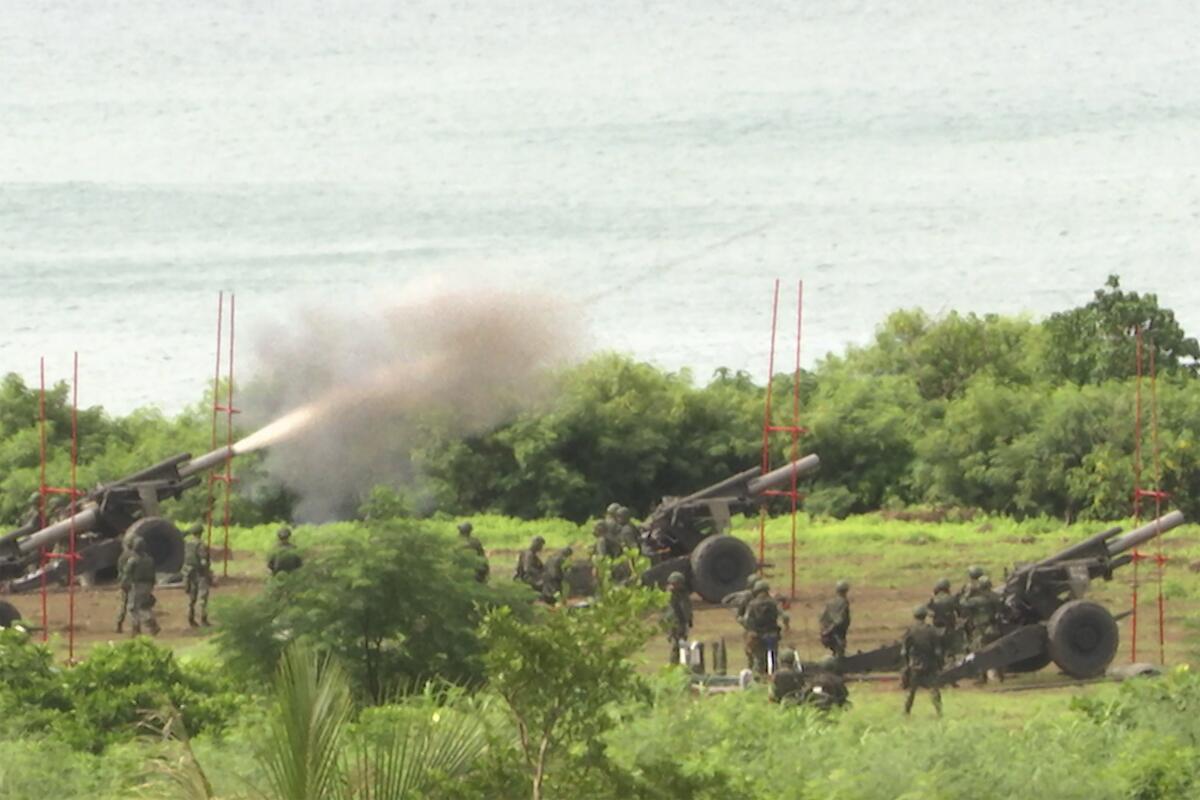Taiwan holds its own live-fire drills, accusing China of rehearsing an invasion

- Share via
PINGTUNG, Taiwan — The foreign minister of Taiwan said Tuesday that China is using military drills to rehearse an invasion of the self-governing island, while the Taiwanese military began its own live-fire exercises in a show of readiness to fend off a potential attack.
Taiwanese Foreign Minister Joseph Wu said Beijing aimed to establish its dominance in the Western Pacific and annex the island, which it claims as its own territory. That would include gaining control of the East and South China Seas via the Taiwan Strait and preventing the U.S. and its allies from aiding Taiwan, he said at a news conference in Taipei, the capital.
China says its drills were prompted by the visit to the island last week by House Speaker Nancy Pelosi (D-San Francisco), but Wu said Beijing was using her trip as a pretext for intimidating moves it has long had in the works. China also banned some Taiwanese food imports after the visit and cut off dialogue with the U.S. on various issues, including military contacts, transnational crime and climate change.
The U.S. has no formal diplomatic ties with Taiwan in deference to Beijing, but is legally bound to ensure the island can defend itself and to treat all threats against it — including a blockade — as matters of grave concern. That leaves open the question of whether Washington would dispatch forces if China attacked Taiwan. President Biden has said repeatedly the U.S. was bound to do so, in comments swiftly walked back by his staff.
The exercises show China’s “geostrategic ambition beyond Taiwan,” Wu said.
“China has no right to interfere in or alter” Taiwan’s democratic processes or interactions with other governments, he said, adding that Taiwan and the mainland are separate jurisdictions, with “neither subordinate to the other.”
China’s furious response could drive more Taiwanese toward independence and push neighboring Asian nations to strengthen their defense strategies.
Since Thursday, China has sent military ships and planes across the midline in the Taiwan Strait and launched missiles into waters surrounding the island. Ignoring calls to calm tensions, Beijing has extended exercises amounting to a blockade without announcing when they will end.
The drills have disrupted flights and shipping in one of the busiest zones for global trade. Taiwan has put its forces on alert, but has so far refrained from taking active countermeasures.
On Tuesday, its military held live-fire artillery drills in Pingtung County on its southeastern coast.
The army will continue to train and build up strength to deal with the threat from China, said Maj. Gen. Lou Woei-jye, spokesperson for Taiwan’s 8th Army command. “No matter what the situation is ... this is the best way to defend” Taiwan.
A stronger army is needed to deter a wider conflict that could entangle the U.S. at a time when calls are growing in Washington to defend the island.
A visitor from the nearby port city of Kaohsiung said the exercises were necessary to “let China know we are prepared.”
“I hope both sides can exercise restraint. Fighting a war is not good for the ordinary people,” said the man, who gave only his surname, Chen.
Taiwan, a former Japanese colony with only loose connections to imperial China, split from the mainland in 1949 after China’s civil war. Despite never having governed the island, China’s ruling Communist Party regards it as its own territory and has sought to isolate it diplomatically and economically in addition to ratcheting up military threats.
Taiwan is a crucial provider of computer chips for the global economy, including China’s high-tech sectors. An extended crisis in the Taiwan Strait, a major thoroughfare for global trade, could have major implications for international supply chains at a time when the global economy is facing disruptions and uncertainty.
More to Read
Sign up for Essential California
The most important California stories and recommendations in your inbox every morning.
You may occasionally receive promotional content from the Los Angeles Times.













